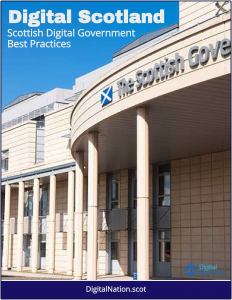Scotland Pioneers Role of Open Data in a Digital Government Strategy
By publishing data in reusable formats, governments empower stakeholders to monitor performance and hold officials accountable.
 Open Data is a cornerstone of a robust Digital Government strategy, enabling transparency, accountability, and public engagement while driving innovation and efficiency.
Open Data is a cornerstone of a robust Digital Government strategy, enabling transparency, accountability, and public engagement while driving innovation and efficiency.
It makes government information accessible to citizens, fostering trust by allowing scrutiny of public spending, policies, and decision-making processes.
By publishing data in reusable formats, governments empower stakeholders to monitor performance and hold officials accountable.
Empowering Open Innovation
Open Data facilitates citizen participation by providing accessible information that enables informed contributions to policy-making. Tools like data portals and AI registers allow communities to engage with government processes, aligning with participatory democracy goals.
By making data freely available, governments enable businesses, developers, and researchers to create new products, services, and insights. This fuels innovation, supports evidence-based decision-making, and stimulates economic activity through data-driven solutions.
Open Data supports internal and external efficiency by enabling data sharing across government agencies and with the public. Transparent data practices, such as public AI registers, build trust by demonstrating ethical use of technology. Open Data ensures that public sector applications of data and AI are inclusive, fair, and aligned with societal needs.
Open Data fosters collaboration between government, civil society, academia, and the private sector. Communities of practice and stakeholder networks amplify the impact of data-driven policies, ensuring they address real-world challenges like climate change or public health.
In essence, Open Data transforms government into a platform for collaboration, innovation, and trust, aligning with the broader goals of a Digital Government strategy to create responsive, inclusive, and efficient public services.
Scotland’s Open Government Action Plan
As they share here, the Scottish Government’s Open Government Action Plan provide updates on five key commitments aimed at enhancing openness, transparency, and participation.
Commitment 1: Fiscal Openness and Transparency
Efforts continue to improve the accessibility and usability of public finance data. Progress includes refining benchmarking against the International Monetary Fund’s Fiscal Transparency Code, with input from the Scottish Human Rights Commission’s Open Budget Index.
A beta solution for standardizing and visualizing budget data is being developed, with plans for a public-facing fiscal portal by early 2025. Engagement with stakeholders, including the Fiscal Openness and Transparency Commitment Group, supports a transparent budget process, with improvements planned for the 2025-26 budget.
Commitment 2: Health and Social Care
The commitment focuses on co-designing health and social care services with service users and staff. The Getting it Right for Everyone (GIRFE) Pathfinder Project is advancing, with 59 co-design sessions planned through February 2025 to develop an adult practice model. These sessions involve underrepresented groups through third-sector partnerships, such as the Minority Ethnic Carers of Older People Project. Outputs, including a national toolkit, are being refined and shared to enhance person-centered service design.
Commitment 3: Data and Digital Commitment
Progress includes expanding open data initiatives, such as the Scottish AI Register, mandated for public sector use since April 2024, with over 60 AI use cases being added. The Find.Data.Gov.Scot platform is improving data discoverability, with plans to add 10 more data sources by November 2025.
Collaboration with climate change and transport teams supports open data for public transport and emissions modeling. The Better Data Community of Practice continues to promote data standards through events and workshops, with a focus on policy development and AI ethics.
Commitment 4: Climate Change
The commitment aims to engage stakeholders in Scotland’s net-zero ambitions by 2045. A stakeholder network supports participation in climate policy, with updated terms of reference and engagement plans. Progress includes co-creating opportunities for public involvement, aligning with the Just Transition approach, and addressing missed emissions targets through enhanced collaboration with diverse organizations.
Commitment 5: Participation
This commitment advances public participation through the Participation Framework Agreement, with training for Scottish Government staff planned for early 2025 to align with policy standards. A social research project on impactful participation concluded in September 2024, with findings to be published in early 2025.
Efforts to improve children’s participation align with the UNCRC (Incorporation) (Scotland) Act 2024, and the National Performance Framework refresh incorporates public engagement outcomes, with parliamentary scrutiny ongoing.
Overall, the report highlights steady progress across all commitments, emphasizing co-creation with civil society, data-driven transparency, and inclusive participation, though some areas, like participation training and citizens’ assemblies, face delays due to resource constraints.



